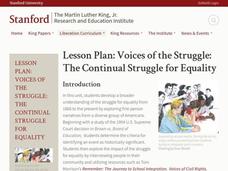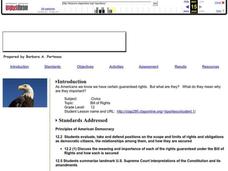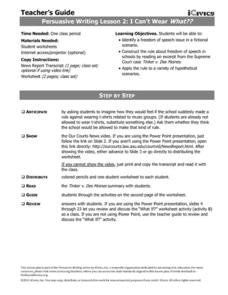Curated OER
Civil Liberties and War Powers: Korematsu v. United States
Eleventh graders compare and contrast Supreme Court decisions dealing with the application of civil rights during times of war, with emphasis on discrimination and detention. Working in groups, 11th graders review cases and analyze how...
Curated OER
Judicial Branch & Supreme Court Questions
In this U. S. government worksheet, students respond to 19 short answer questions about the responsibilities of Supreme Court members in the United States.
Curated OER
Supreme Court Decisions and the CRM
Eleventh graders investigate different Supreme Court decisions. For this Civil Rights lesson, 11th graders research and read the decisions of specific court cases. students write a short essay describing the effects of these cases.
Stanford University
Voices of the Struggle: The Continual Struggle for Equality
As part of a study of the Civil Rights Movement from 1868 to the present, class members examine first person narratives, the Supreme Court case Brown v. Board of Education, and other significant events in civil rights history. They then...
Curated OER
Decisions, Decisions...
Young scholars explore some of the top Supreme Court cases of the 1998-1999 term, assessing the issues behind these cases and the potential impact of the decisions made by the Court. Small groups closely examine one of this term's...
Curated OER
Bill Of Rights
Students examine Supreme Court cases. In this U.S. government lesson, students watch a video about the Bill of Rights and then research 4 Supreme Court cases using the noted web site. Students analyze the presented information and write...
Curated OER
The Race to Learn
Students explore the history of education and race in the United States. By researching Supreme Court cases dealing with race and education, students examine the ways in which these cases have reflected changing social and cultural norms.
Curated OER
The Bill of Rights
Ninth graders examine various Supreme Court Cases. In this American Government lesson, 9th graders research a specific Supreme Court Case. Students create a multiple choice assignment based on their assigned case.
Curated OER
Symbolic Speech
Ninth graders consider the right of freedom of speech as it is outlined in the U.S. Constitution. They receive background information for the US Supreme Court, the Bill of Rights, and free speech. They discuss a series of actual cases...
Curated OER
From Tinker to Fraser: Freedom of Speech in Public Schools
The Tinker and Fraser cases were taken the Supreme Court on the basis of the 1st Amendment right to Freedom of Speech. Learners discuss each case, the First AMendment, complete handouts, and conduct a role play activity. Handouts are...
Curated OER
Bill of Rights
Twelfth graders list, describe, and illustrate the specific rights guaranteed to individuals and how they are secured. Then they examine landmark Supreme Court cases, such as, Airport Commissioner vs. Jews for Jesus, New Jersey vs. TLO,...
Curated OER
Boundary Crossing
Seventh graders explore the issues that arose as a result of boundary crossing. For this US History lesson, 7th graders research supreme court cases in regards to crossing boundaries. Students present their findings to the class.
Curated OER
Indiana Courts: How Do They Work?
Students identify the branches of Indiana's judicial system and determine the differences between the different courts and different types of cases. Students create a flow chart showing how a court case works its way through the legal...
iCivics
Argument Wars
From start to finish, here is a fantastic resource that uses engaging activities and an interactive virtual game to teach about major US Supreme Court cases. Your class members will distinguish the primary arguments made in such cases as...
C-SPAN
The Impact of Citizens United v. FEC
What began as an effort to show a movie by an interest group has impacted financing of federal elections. Did the Citizens United case lead to more "dark money" in politics, or did it shine a light with more speech? Using video clips...
Judicial Learning Center
Judicial Independence
Most people support the idea of an independent judiciary in theory until they hear about a court case that violates their principles. An informative resource explains why the concept is important. It also provides scholars of criminology...
Curated OER
The ADA, the Supreme Court, and Self-Advocacy
Students study the role the Supreme Court plays in laws and decisions that affect individuals with disabilities and examine the policies of the American with Disabilities Act. They draw parallels between policies enacted by the ADA and...
Judicial Learning Center
Article III and the Courts
What's the best way to make sense of the Constitution? A helpful lesson contains both the text of Article III and annotation of each of its sections, breaking it down into easy-to-understand parts. It also includes links to a glossary...
Pacific University Oregon
Civil Rights: US History
To gain an understanding of the Civil Rights Movement of the 1960s, class members investigate the Jim Crow Laws, the Emancipation Proclamation, the 13th, 14th, and 15th Amendments of the US Constitution, and the 1898 Supreme Court case,...
Teaching for Change
A Documents-Based Lesson on the Voting Rights Act
How did the Voting Rights Act affect the daily lives of American citizens? A document-based lesson developed by the Student Non-Violent Coordinating committee (SNCC) presents a case study of the impact of the Voting Rights Act of 1965 on...
Curated OER
What is Public Use?
Explore the Fifth Amendment by examining the meaning of "public use" as learners read a scenario and role play their assigned parts to determine "public use." They also read Supreme Court Cases regarding the amendment and present their...
iCivics
I Can’t Wear What?
Can schools ban t-shirts picturing musical groups or bands? Your young citizens will find out with this resource, which includes a summary of a United States Supreme Court case from the 1960s about a similar dispute over students wearing...
Curated OER
Making the Supreme Court Matter to Teens
Here are lessons and ideas to help social studies teachers enlighten students about the importance of the Supreme Court.
Curated OER
Mapp v. Ohio (1961)
Students examine warrantless searches and due process. For this Supreme Court lesson, students examine primary documents from Mapp v. Ohio and discuss the implications of the decision.

























